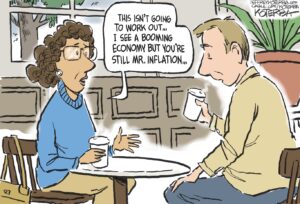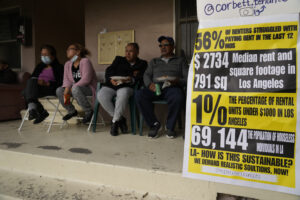All Men Are Created Equal; Not So Much in the USA
I was drawn into my pile of OECD documents and charts by a column last week by Eduardo Porter of The New York Times under the headline: "Inequality in America: The Data Is Sobering."
Fair warning: This column is about gigabytes of data collected by the Organization for Economic Cooperation and Development, focusing mainly on Gini coefficients for the 34 member nations of the OECD. The purpose of this exercise, is to try to use OECD data and analysis to determine whether life in the United States is getting better or worse by studying statistics on inequality in our nation.
I was drawn into my pile of OECD documents and charts by a column last week by Eduardo Porter of The New York Times under the headline: “Inequality in America: The Data Is Sobering.” The OECD, which was created in 1960, is an outgrowth of the conferences and studies done after World War II to try to understand what it is that makes life better (or worse) in developed countries around the world.
The organization, based in Paris, could be thought of as a big think tank that produces Niagaras of numbers in reports that people like me — and Porter, I assume — store in neat piles we intend to read one day because we know they are important. (A lot of people do the same with The New Yorker.)
Trying to build a little on Porter’s work — he has been writing about American inequality for years — I plowed through my piles and came away at least as worried as he seems to be. His conclusion was:
“The good news is that President Obama appears to have decided to devote the rest of his presidency to trying to tackle the forces behind the yawning inequities that have hamstrung social and economic mobility, eroding the living standards of the middle class. The bad news is that he may not be up to the task.”
Which brings us to Gini coefficients. That would be Corrado Gini, an Italian statistician who, in 1912, created a scale designed to quantify inequality and quality of life in any society. The Gini scale, based on income, runs from zero to one. “Zero” means that all people have equal income. “One” means that one person gets all the income.
“One” sounds like the end point of pure capitalism, doesn’t it?
To end the suspense, based on the most recent available statistics, the Gini coefficient of income inequality of the United States is about 0.38. That compares to an OECD average of just above 0.30. Many of us know what’s happening, but the OECD puts it into numbers: The income of the middle class in the United States decreased by 4 percent from 2000 to 2010. The same number in Australia increased by 40 percent in those years. Sweden was up 27 percent, Canada up 20 percent, Great Britain up 12 percent. Three countries — Mexico, Turkey and Chile — have more inequality than the United States.
In words, the OECD states: “The wealthiest Americans have collected the bulk of the past three decades’ economic gains. The share of the national income of the richest 1 percent more than doubled between 1980 and 2008. … The main reason for widening inequality in the United States is the widening wage gap.”
Porter, in The Times, catalogued effects of that inequality with some very depressing findings:
“The United States remains among the richest countries in the world. National income per person trails only that of Norway, Luxembourg, Singapore, Switzerland and Hong Kong. Yet despite its riches, in many areas the United States looks surprisingly, depressingly backward.
“Infant and maternal mortality are the highest among advanced nations. So is the mortality rate of children under the age of 20. Life expectancy — at birth and at age 60 — is among the lowest.
“Teenage pregnancy rates are not only higher than in other rich nations, they are higher than in Kazakhstan and Burundi. The United States has the highest rate of children living with a single parent among the industrialized nations in the Organization for Economic Cooperation and Development. Within the organization, only in Turkey, Mexico and Poland do more children live in poor homes.”
If we still believe that in our America all men and women are created equal, then perhaps we should try to understand why things are going downhill from there for most of the people most of time.
© 2013 UNIVERSAL UCLICK
Your support is crucial...As we navigate an uncertain 2025, with a new administration questioning press freedoms, the risks are clear: our ability to report freely is under threat.
Your tax-deductible donation enables us to dig deeper, delivering fearless investigative reporting and analysis that exposes the reality beneath the headlines — without compromise.
Now is the time to take action. Stand with our courageous journalists. Donate today to protect a free press, uphold democracy and uncover the stories that need to be told.






You need to be a supporter to comment.
There are currently no responses to this article.
Be the first to respond.